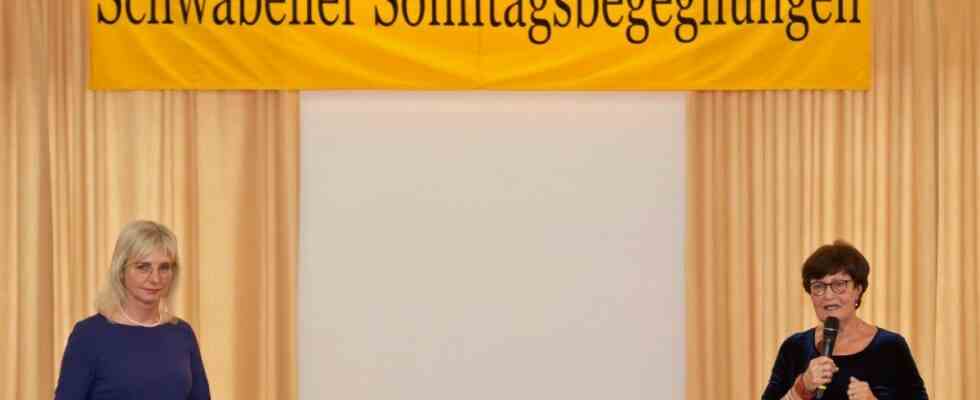Hands are shaken over the backs of chairs, combined with the wish: “A guads Neis!”, a dachshund wobbles through the rows. The Markt Schwaben Sunday meetings, initiated by Bernhard Winter, start the new year with a question that at first glance may not necessarily have current world events in its sights – climate change, for example, the war in Ukraine or the energy crisis.
“Women, men, equal rights – is that the right topic now?” Asks Christa Stewens, former Bavarian Minister for Labor and Social Affairs, in the direction of the host. Together with her successor, Ulrike Scharf, she is to discuss this at the 112th edition of the series of events. But Stewens answers the question himself: “Equality has been a hot topic since I’ve been in politics.”
Part-time work and self-doubt as a stumbling block for your career
During her tenure, she says, the “Girls’ Day” program, for example, did not bring the hoped-for success: when there are around 300 training occupations to choose from, girls still tend to choose the same ten, namely those in the social and nursing fields , commercial go. Ulrike Scharf also emphasizes: “We are far from having reached our goal, neither in the economy, in society, nor in politics.” She appeals to women to generally trust themselves more. If a woman were asked whether she could imagine becoming a mayor or councillor, self-doubt would often prevail. Men, on the other hand, would be much quicker to say, “Of course I can.”
“It’s also a reflection of management positions,” says Scharf. The number of women in executive positions in business is increasing; nevertheless there are still far too few. One focus of the discussion is on gainful employment that is carried out on a part-time basis. “The female employment rate in Bavaria is over 80 percent,” says Ulrike Scharf. If you take a closer look, however, it becomes clear that 60 percent of women work mini-jobs and part-time – a stumbling block for retirement, as Scharf puts it.
More and more people with disabilities are making the leap onto the first job market
As Minister, Christa Stewens dealt intensively with the subject of part-time work. “Part-time is also a major career barrier,” she says, sharing her own research. It has been shown that women who work part-time are judged worse by their superiors than their male colleagues who work full-time. “We looked into this and it turned out that employers say to themselves: Those who work part-time are not always available for me,” says Stewens. “That’s why women usually get a worse rating.” The topic seemed so urgent to Stewens at the time that she drafted a proposal for the Council of Ministers and also discussed it with the Prime Minister at the time, Edmund Stoiber.
The CSU politicians also focus on women with disabilities, who experience particular disadvantages in the labor market. Sharply emphasized that the Federal Participation Act was long overdue – but its implementation was a major challenge. “I see so much potential,” she says. “So many success stories of people making the transition from sheltered workshops to the regular job market.”
Hate speech affects girls and women in particular
Another important keyword is digital violence: According to Christa Stewens, hate speech affects women and young girls in particular – a problem that we as a society must deal with more. There are often no longer any inhibitions on the Internet to judge people. “Retreat as a reaction is the worst alternative here,” warns Scharf. Incredibly many cases of hate speech against women were counted, and the trend is rising; “a dramatic development”. Many comments would be sharp on the border of the criminal offense. “Please report everything,” Ulrike Scharf appeals – even if you are not affected by hate comments online.
By and large, the conversation is not an exchange in the true sense, but rather consists of first- and second-hand reports of experiences. At the same time, the two politicians put their fingers on problems that have not yet been sufficiently dealt with, and they also repeatedly address the politicians present – often a “Dear Tom” goes in the direction of CSU member of parliament Thomas Huber.
Incidentally, the revelation of the morning is a trend that affects the Bavarian dads: Compared to other federal states, they take parental leave most often. “We are at the absolute top when it comes to paternity leave,” says Ulrike Scharf. One can only speculate as to why this is so. With a smile she suspects: “We Bavarians are probably much more modern than we are perceived from the outside.”

